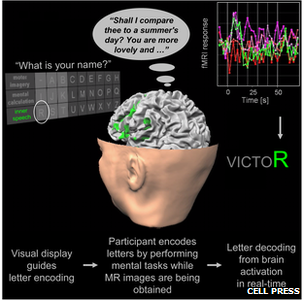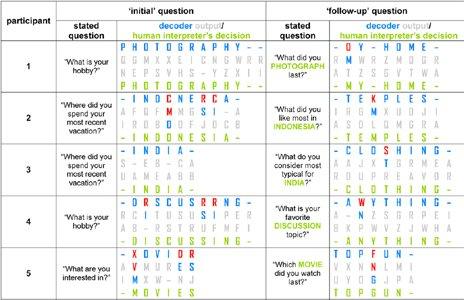New brain scanner helps paralysed people spell words
- Published

fMRI is usually used to track brain activity by measuring blood flow
A new brain scanner has been developed to help people who are completely paralysed speak by enabling them to spell words using their thoughts.
It uses functional magnetic resonance imaging (fMRI) to help patients choose between 27 characters - the alphabet and a blank space.
Each character produces a different pattern of blood flow in the brain, and the device interprets these patterns.
The British Neurological Association called the research "exciting".
The study appears in Current Biology journal of Cell Press.
fMRI is normally used to track brain activity by measuring blood flow.
Earlier research
The new technology is based on earlier applications of the technique, which used free-letter spelling to allow people to answer the equivalent of multiple-choice questions with just a few possible answers.
British neuroscientist Adrian Owen, for instance, used fMRI to help a man believed to have been in a vegetative state for five years to answer "yes" and "no" questions by interpreting his brain activity.
But the new scanner uses the entire English alphabet and the blank space.
"This novel spelling device constitutes an alterative approach to motor-independent communication," Bettina Sorger of Maastricht University in The Netherlands, one of the researchers working on the current study, told the BBC.
"The work of Adrian Owen and colleagues led me to wonder whether it might even become possible to use fMRI, mental tasks, and appropriate experimental designs to freely encode thoughts, letter-by-letter, and therewith enable back-and-forth communication in the absence of motor behavior."
The team writes in the paper that because the noninvasive device requires "only little effort and pretraining, it is immediately operational and possesses high potential for clinical applications, both in terms of diagnostics and establishing short-term communication with nonresponsive and severely motor-impaired patients".

The new scanner uses the entire English alphabet and the blank space
Exciting results
Elaine Snell of the British Neuroscience Association told the BBC that the technology could become "a lifeline" for patients in a persistent vegetative state, or suffering from other neurological disorders.
"This means of communication will make a huge difference to the quality of their life and to that of their families.
"This kind of technology can only get better, it's very exciting."
Dr Guy Williams from the Wolfson Brain Imaging Centre in Cambridge agreed.
"The technique may need some adaptation to be widely applicable to patients who might have impaired awareness or ability to concentrate on the required task, but it is nonetheless an important demonstration of what these scans can in principle tell us about the functioning of an individual's brain," he told the BBC.
- Published28 February 2012
- Published10 October 2011
- Published6 December 2011